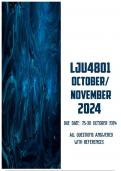Exam (elaborations)
LJU4801 October/November 2024 | Due 30 October 2024
- Course
- LEGAL PHILOSOPHY (LJU4801)
- Institution
- University Of South Africa (Unisa)
- Book
- Legal Philosophy
LJU4801 October/November 2024 | Due 30 October 2024. All questions answered with references. Question 1 Read the following scenario and then answer the question below: The football governing body is investigating Mark Pachio’s deliberate handball during the quarter final match between Shibobo F...
[Show more]



